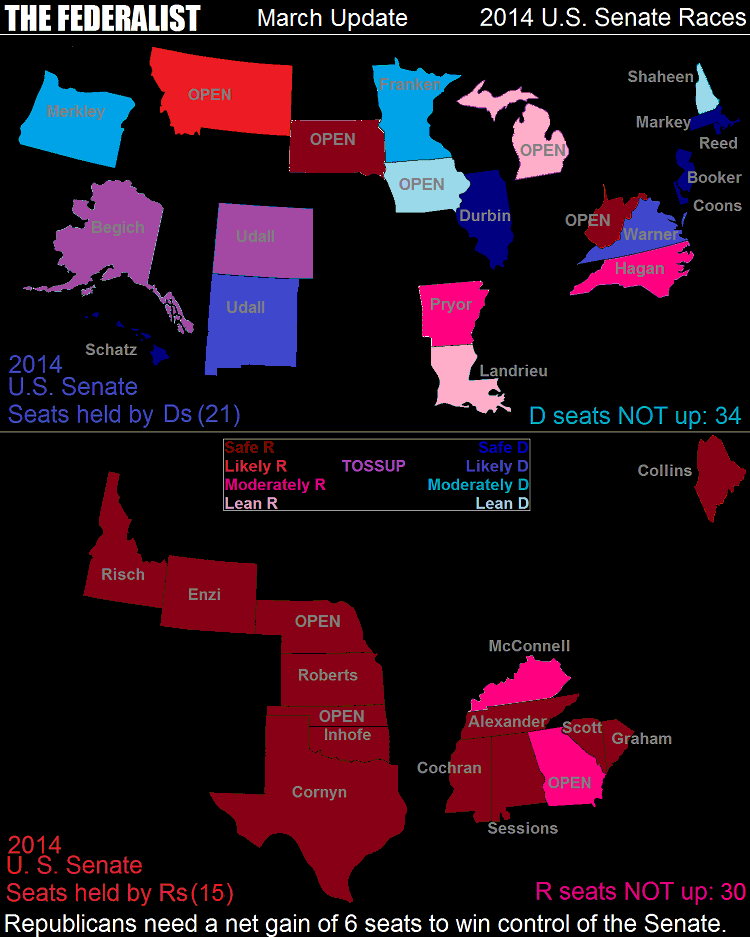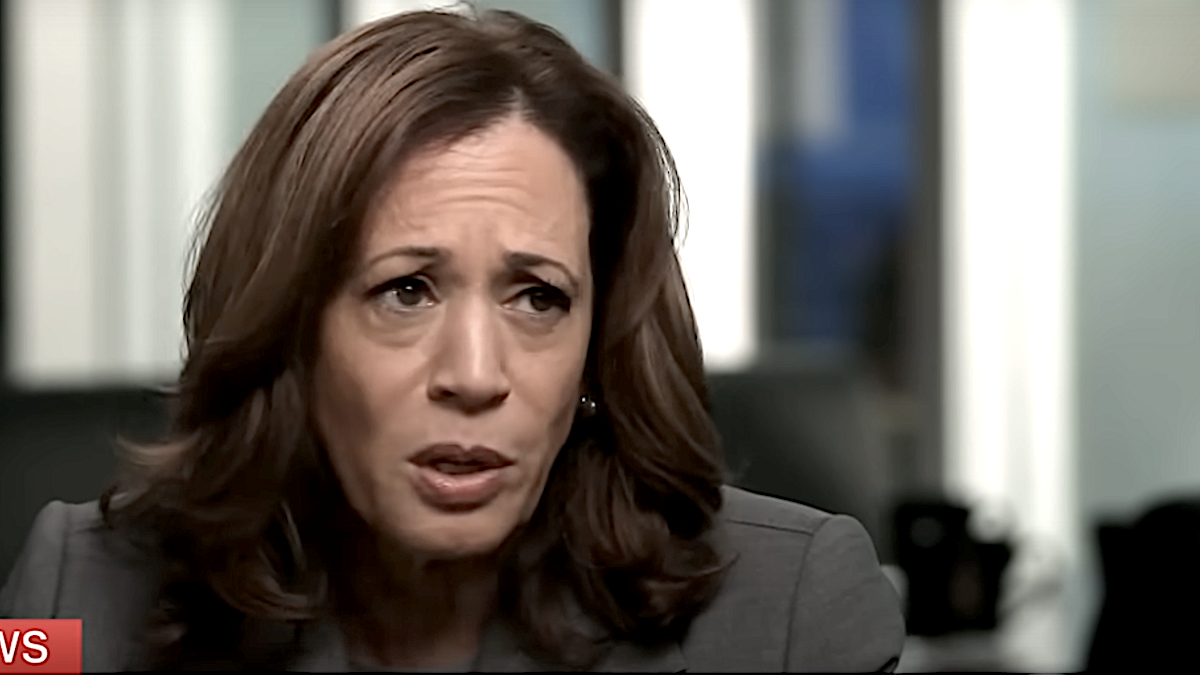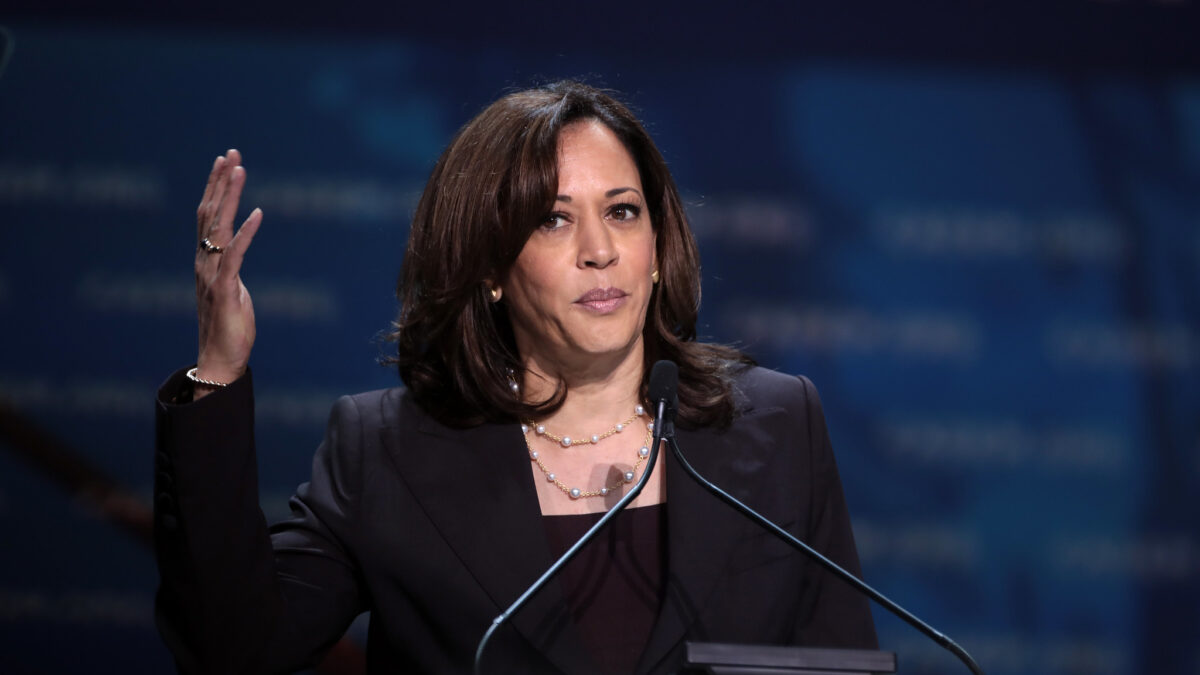
Before I get into the state-by-state changes since the last breakdown, I have been grouping the contests into various “firewalls” the Democats have to stop Republican advancements across the map.
Firewall One. The open (or mostly open, until the Walsh appointment) seats in Romney states: Montana, West Virginia, and South Dakota.
Firewall Two. The remaining Romney state seats where Republicans must face Democrat incumbents:
Arkansas, North Carolina, Louisiana, Alaska.
Firewall Three. The open seats in the 2012 swing states:
Michigan and Iowa.
Firewall Four. The 2012 swing states with incumbent Democrats:
Minnesota, Colorado, New Hampshire, Virginia.
Firewall Five. The seats that flipped to the Democrats six years ago during President Obama’s big win over McCain not already listed.
Oregon and New Mexico.
So where does the battle for the Senate stand today?
South Dakota and West Virginia have become Solid Republican seats
I was hesitant to move South Dakota over, thanks in part to the threat of potential siphoning from third party players, but with Rasmussen’s poll showing Rounds up twenty points on his Democratic opponent, and a building bipartisan consensus on the futility of the race for the Democrats there, it was time to shift it into it’s likely projected spread for November: I forecast the Republicans will carry the state by at least a fifteen point margin. Likewise, West Virginia, already considered a likely Republican win, is being moved over to solid, as Capito has dominated the race and Democratic donors are focusing more on protecting incumbents than trying to save the seat being vacated by Senator Rockefeller. With Montana as a likely (Walsh’s appointment gives him some time to cast some conservative votes, which he may use to close the gap but not nearly enough to hold the seat), Republicans now seem to have a sturdy foundation for gains in the midterm, with half the seats needed to hit the 51 for majority.
Arkansas and North Carolina have become moderately Republican seats
Both incumbents have war chests and name recognition, and that’s where their advantages effectively end. Senator Mark Pryor remains the more endangered of the two, as he is representing a state that is growing more Republican by the year, his latest gaffes about military service leading to an entitlement mentality, and has the worse head-to-head polling numbers; but Senator Kay Hagan’s approval numbers, if the latest Elon poll is to be believed, are radioactive at just 33%. Thom Tillis, the front runner in the Republican primary, may not be well liked either, but his numbers, infact, even President Obama’s, are healthier than the embattled senator. We forecast a loss approaching ten points for Pryor, and just over five points for Hagan now.
Colorado has become a toss-up race
Republicans in Colorado pulled a rather surprising switch-a-roo last week, with Representative Cory Gardner of the 4th district swapping races with Ken Buck. Amy Stephens also withdrew from the race, leaving Owen Hill left in the primary for the Congressman to contend with. Incumbent Democratic Senator Mark Udall had been enjoying small leads over the existing field, but party efforts to wrap things up, and their success in recruiting Gardner to me now means the Senator lacks the divided opposition with which he was keeping his head above water. The Congressman had to have seen something to encourage him to reverse his earlier decision (made when Senator Udall’s numbers were much stronger), and I am interested to see if the public polling confirms it. Senator Udall was enjoying sizable, then moderate leads over the course of this past year. Just before last week’s events, he was maintaining a small edge over a relatively weak Republican field. Against a more unified opposition, he is now facing a toss-up contest for re-election.
Virginia is now more in Mark Warner’s favor
Finally some good news for the Democrats, though it is little comfort with the number of states they have weakened in. Ed Gillespie made waves when he announced he would challenge the incumbent Senator, but the polling hasn’t shown as much as a splash: he currently trails Warner in the latest Roanoke poll by over twenty points. There is still plenty of time for Gillespie to make this a real contest, but so far Senator Warner is avoiding the fate besetting many of his colleagues.

While no new states have popped on the radar for the GOP, solidifying their positions in several races (Montana, South Dakota, and West Virginia), improving theirs in two others, and making a big, concerted play for a race that wasn’t already favoring them (Colorado) has made the Democrats’ position all the nastier: even if you make all of the leaning GOP races tossups, Republicans need to win just one out of four more races to win a majority. They still have to keep their eye on two of their own seats- Kentucky and Georgia- but at this point they are more favored to gain everything in light pink and better, and perhaps even one of the toss-up races, than they are to lose either of their own vulnerable races. In fact, even if the Democrats were to succeed in, say, Georgia, they are slight-to-serious underdogs in enough remaining seats to still give the Republicans a majority.
The election is still eight months out, and as we had seen in the previous eight months, much can happen to change the fortunes of both parties. The Democrats started out with a political geography that wasn’t going to favor them this cycle- defending seven seats in states that went to Mitt Romney- but so long as that remained their vulnerable field, they could counter with targeting the unpopular Senate Minority Leader (Kentucky) and aiming for an open race in a light red state (Georgia). The GOP would need to hold their own and win six out of seven Democrat-held contests to win a majority, and their track record in 2010 and 2012 made that seem very unlikely.
However, as of March 2014, the GOP has locked away two races, closed in on a third, well on their way with two more, and slight favorites in yet two more, giving the Republicans room to make an effective push into more purplish territory. They are fiercely contesting an open race in Michigan and now an incumbent in Colorado, and are threatening to do so in Iowa and New Hampshire. The higher they raise their maximum potential gains, the lower the number of races the Democrats can afford to write off. Despite the slacking off in Virginia, this remains a challenging map for those left-of-center.
As of today, the Democrats are in deep trouble. We aren’t forecasting a landslide win for the GOP — eight months is a lifetime. But with the second firewall already burning and Republican advancements into states they failed to win in 2012, they may be well on their way.
Brandon Finnigan has been covering polls and elections at the blog Ace of Spades HQ and on Twitter at @conartcritic since 2010. Between races, he shares his love of art, astronomy, and craft beer with his wife in Southern California.









